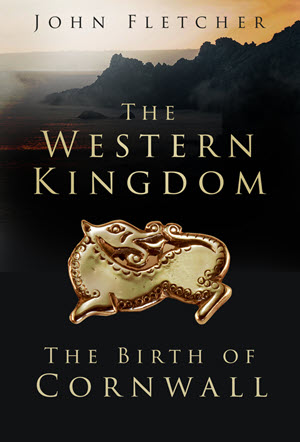The Western Kingdom
 It might look like it from the cover, but this is not a fantasy novel. As the subtitle explains, The Western Kingdom is a history of the birth of the Kingdom of Cornwall, probably the oldest kingdom in the UK.
It might look like it from the cover, but this is not a fantasy novel. As the subtitle explains, The Western Kingdom is a history of the birth of the Kingdom of Cornwall, probably the oldest kingdom in the UK.
What?
Yes, it is true. England, Wales, Ulster and Scotland did not become unified kingdoms until part way through the early Mediaeval period. Cornwall, on the other hand, appears to have been a unified and politically distinct entity from the withdrawal of the Romans onwards.
This should not be surprising. Cornwall was a wealthy, tin-exporting polity before the Romans arrived. Having been busily trading with the Romans for some time, the Cornish didn’t worry too much about the invasion. They just kept on selling the Romans what they wanted. And the Romans were grateful not to have to bother conquering them. When the Romans left, Cornwall just carried on as before.
Of course it wasn’t called Cornwall back then. The post-Roman Cornwall was the Kingdom of Dumnonia, which stretched all the way up to the west bank of the River Parrett in Somerset. This is interesting to me, because it means that technically I’m Dumnonian by birth. However, Dunmonia was not entirely a united political unit. The folks living east of the River Tamar appear to have viewed themselves as distinct in some way, and with time Dumnonia shrank back to its modern boundary and became Kernow, or Cornwall.
The problem for Cornwall was their new neighbour, an aggressively expansionist Saxon kingdom called Wessex. While we are more familiar with Alfred the Great, and with Athelstan, whose diplomatic skills enabled him to unite all England under his rule, John Fletcher thinks we should also pay attention to Ecgberht. He grew up at the Frankish court, in exile while Offa of Mercia ruled Wessex though a puppet king. There he learned the political and military skills that allowed him to take Somerset and Devon from Dunmonia, and establish the strong kingdom that his grandson, Alfred, would inherit.
Mention of Alfred brings us to the Vikings. They don’t seen to have troubled the Cornish much. That’s partly because their favourite strategy was to sail up rivers to strike at wealthy, inland towns. Cornwall does not lend itself to that sort of thing. In addition, by the time the Vikings began settling in England in earnest, they had been trading with the Cornish for some time. This, of course, meant trading in slaves, because Dublin (a Viking city) was one of the biggest slave-trading ports in Europe at the time.
Back with the Saxons, it is worth noting that they did not refer to Dumnonia by it’s name. They called it West Wales, because the people there spoke more or less the same language as the people in the area we now call Wales. It is also worth noting that the Cornish were very much a sea-faring people (they have to be, have you ever tried to drive around the place?). We know that they had very close relations with the Bretons (whose language is also very similar to Welsh). It seems reasonable they would also have travelled back and fore across the Severn Estuary.
After the Vikings came William. Again this did not worry the Cornish too much as their Breton cousins had been dealing with the Normans for some time. Also the Cornish hated Harold Godwinson who had raided the south-west in his younger days when he was living in exile in Ireland.
By this time Cornwall had been more or less absorbed into England, having Norman nobles and bishops ruling over them. But in 1201 King John was persuaded to allow the creation of the Stannary Parliament, which was officially only for the tin industry but effectively made laws for Cornwall. It sat on and off until 1753.
I found this a fascinating book. Despite growing up in Dunmonia, I was taught almost none of this history. Alfred was the only local figure we knew of. Much of this is due to the perception that the early Mediaeval period was a ‘Dark Age’ when civilization was lost and little of note happened. The existence of Cornwall as a wealthy and independent kingdom for several hundred years after the departure of the Romans was ignored. I’m grateful to John Fletcher for shedding some light on the period.
I would imagine that Lucy Hounsom wishes she’d had this book when she was writing SisterSong. I also think it is time for someone to do for Dumnonia what Nicola Griffith has done for Northumbria.

Title: The Western Kingdom
By: John Fletcher
Publisher: The History Press
Purchase links:
Amazon UK
Amazon US
Bookshop.org UK
See here for information about buying books though Salon Futura